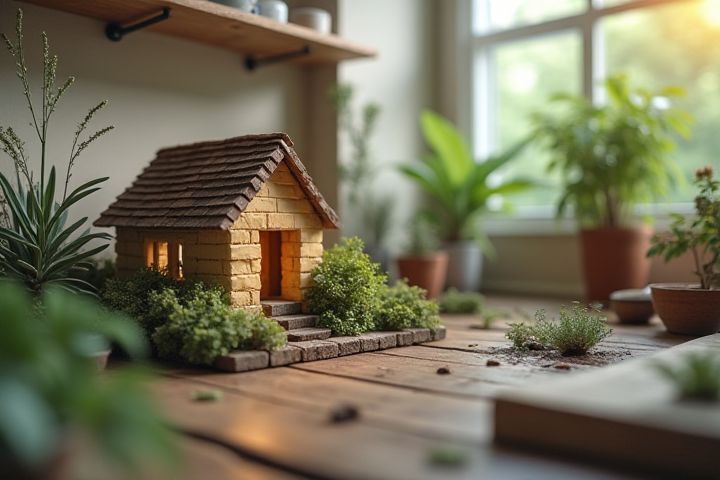
To reduce house energy consumption, start by upgrading to energy-efficient appliances that come with ENERGY STAR ratings, which significantly cut down electricity usage. Insulating your home properly helps maintain temperature, reducing the need for heating and cooling, thus lowering energy bills. Utilizing programmable thermostats allows you to optimize heating and cooling schedules to match your routine, saving energy during unoccupied times. You can also switch to LED lighting, which uses up to 75% less energy than traditional incandescent bulbs. Finally, consider incorporating renewable energy sources, like solar panels, which can further decrease reliance on non-renewable energy and reduce utility costs over time.
How To Reduce House Energy Consumption
Upgrade to LED lighting
Upgrading to LED lighting can significantly reduce your home's energy consumption. LED bulbs use up to 80% less energy than traditional incandescent bulbs, providing the same brightness with a fraction of the wattage. This transition not only lowers your electricity bills but also enhances your home's energy efficiency, contributing to a smaller carbon footprint. By choosing LED lighting, you can enjoy a longer lifespan for your light fixtures, which means less frequent replacements and reduced waste.
Install smart thermostats
Installing smart thermostats can significantly reduce your home's energy consumption by optimizing heating and cooling schedules based on your daily habits. These devices utilize advanced algorithms and sensor technology to learn your preferences, adjusting temperatures automatically when you're away or sleeping. By integrating with mobile apps, you can conveniently monitor and control your home's climate remotely, leading to more energy-efficient practices. Investing in a smart thermostat not only enhances comfort but can also lead to substantial savings on your utility bills.
Improve home insulation
Improving home insulation is a crucial step in reducing energy consumption and enhancing overall comfort. By sealing gaps and cracks in walls, floors, and around windows with materials like weatherstripping and caulk, you prevent heat loss during winter and keep cooling air inside during summer. Installing high-quality insulation in attics, basements, and crawl spaces can significantly lower your heating and cooling costs, as it creates a thermal barrier that regulates indoor temperatures. You can further maximize efficiency by utilizing energy-efficient windows and doors that minimize drafts and enhance your home's thermal performance.
Use energy-efficient appliances
Investing in energy-efficient appliances can dramatically lower your household energy consumption, often reducing your utility bills by up to 30%. Look for products labeled with the ENERGY STAR certification, which guarantees that they meet strict efficiency guidelines set by the U.S. Environmental Protection Agency. For instance, energy-efficient refrigerators use around 20% less electricity than their non-efficient counterparts. By replacing older appliances with modern, efficient models, you can significantly decrease your environmental impact while enjoying improved performance.
Seal windows and doors
Sealing windows and doors can significantly reduce your energy consumption by preventing drafts, which can account for up to 30% of your home's heating and cooling losses. A simple weather stripping installation costs between $0.75 to $5 per foot and can save you approximately 10% on your energy bill annually. For an average household, properly sealing these entry points can equate to savings of $200 or more per year in heating and cooling costs. Investing in high-quality caulking and weather stripping materials ensures durability and maximizes your energy efficiency gains, enhancing your home's comfort levels.
Utilize solar panels
Utilizing solar panels is an effective way to reduce your home's energy consumption. By harnessing renewable solar energy, you can significantly decrease reliance on conventional energy sources, minimizing your carbon footprint and reducing utility bills. Installing solar panels can also increase your property's value, making it a smart investment for the future. With various incentives and tax credits available, transitioning to solar energy is not just environmentally friendly; it is also a financially savvy choice for homeowners.
Implement energy-efficient landscaping
Implementing energy-efficient landscaping can significantly lower your home's energy consumption by strategically placing trees and shrubs. Deciduous trees, for example, can reduce cooling costs by up to 30% during summer months when positioned to shade windows. Native plants require less water and maintenance, leading to a decreased need for irrigation systems and fertilizers. Furthermore, incorporating mulch and high-efficiency irrigation technologies can lead to a reduction in water waste by up to 50%.
Lower water heater temperature
Lowering your water heater temperature to 120 degrees Fahrenheit can significantly decrease energy consumption while still providing adequate hot water for daily use. This adjustment can reduce energy costs by approximately 6-10% for every 10 degrees lowered. Additionally, maintaining a lower temperature helps extend the lifespan of your water heater and reduces the risk of scalding. Regularly insulating your water heater and the first few feet of hot water pipes can further enhance energy efficiency in your home.
Practice energy-saving habits
To reduce house energy consumption, practice energy-saving habits that can significantly lower your utility bills. Implementing simple changes such as turning off lights in unoccupied rooms can decrease electricity use by up to 15%. Using energy-efficient appliances that have an ENERGY STAR rating can reduce energy consumption by approximately 10-50% compared to standard models. Additionally, setting your thermostat a few degrees lower in winter and a few degrees higher in summer can save you around 10% on heating and cooling costs annually.
Regular maintenance of HVAC systems
Regular maintenance of HVAC systems can significantly reduce your home's energy consumption, leading to lower utility bills. Cleaning or replacing filters every one to three months can improve airflow by up to 15%, ensuring your system operates efficiently. Scheduling an annual professional inspection can identify issues, enhancing the system's efficiency by up to 30%. By maintaining optimal refrigerant levels and cleaning coils, you can save as much as 20% on energy use while extending the lifespan of your HVAC unit.
